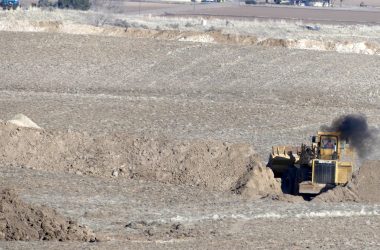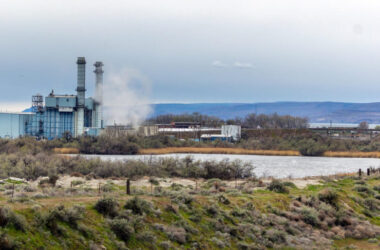ONTARIO – A bid for more funding for the beleaguered Treasure Valley Reload Center evaporated last week after the Eastern Oregon Border Economic Development Board took no action on a request $1.5 million.
The request didn’t qualify for existing funding programs, board officials said.
The Malheur County Development Corp., the public company set up by the county to oversee the reload center, sought the money to cover expenses ranging from engineering fees to rock for roads.
Grant Kitamura, president of the development company, along with state Sen. Lynn Findley, R-Vale, briefed the board Monday, Dec. 5, on the necessity of the funds and pledged the project will boost economic development in the county.
“We’re here, kind of begging,” Kitamura told the board.
Though receptive, the Border Board was unable to help.
“The board does not currently have a mechanism for unsolicited funding requests such as this,” said board chair Tiffany Cruickshank.
Cruickshank said after the meeting that the board created a working group to review what “an unsolicited grant process may look like.”
“We are in the early stages of that. The border board has been very intentional in the way we crafted our programs and funding priorities to maintain alignment with the legislative intent. So, we want to make sure we continue that trend of being intentional and thoughtful,” said Cruickshank.
Greg Smith reports “no records exist” in any way relating to that $1 million financing.
Kitamura said last week the decision by the board “wasn’t a no. It was a ‘we are not geared for that.’”
What that means now for the reload project remains unclear.
Project managers are scrambling to find money to cover an estimated $8 million in costs that exceed its original budget of $26 million. They hope to get the money in time to keep construction going ahead of an opening in fall 2023.
But the border board’s stance means the project doesn’t immediately have money to pay for key tasks.
The Malheur County Court on Wednesday, Dec. 14, is scheduled to again take up the project managers’ request for an emergency infusion of $2 million from the county treasury. That money is needed to install an additional rail spur that project managers had postponed.
The project managers also have listed an immediate effort to get $1 million from “other” sources that Greg Smith, project manager recently said was a certainty.
“I feel comfortable that I can secure an additional million dollars from another source to bring to the project,” he told the development company board on Oct. 25.
Kitamura elaborated in his presentation to the border board, saying that money would come from a loan from Morrow Development Corp., a Heppner-based nonprofit managed by Smith.
But Smith said by email that no application had been made for that loan. On Friday, he responded to a public records request by saying there were no records at all regarding such a potential loan.
He also said that “no records exist” in any way relating to that $1 million financing. He responded to a public records request that said the intent was “to verify that Mr. Smith has in fact developed such a source.”
“We have to make additional plans,” Kitamura said in an interview, expecting the development company board to meet with Smith to “see what other ideas he has.”
The development company has listed an immediate need for $4.5 million to finish rail installation and install roads and utilities. Kitamura presented the border board with a three-page budget document that included handwritten notes in various colors of ink to explain the need.
READ IT: Colored-coded money pitch
Kitamura has been president of the development board since its formation in 2017 but provided the border board inaccurate or confusing information.
He told the board that Americold, the Georgia-based storage and shipping company, had leased the shipping center from the county. The lease is with the development corporation, not the county.
He also said lease payments, set in the lease at $2,500, would go the county. The lease calls for the payments to go to the development company.
He also said the development company was “part of the county.”
While it was created by county officials, it is an independent business operating separately from county government.
In his remarks to the board, Findley blamed the Oregon Department of Transportation for putting the project behind schedule, suggesting the agency was late in selling state bonds to raise money for the Nyssa project. The bonds were handled by a different state agency, the state Treasury Department.
He said that money for the Nyssa project wasn’t available from the state until 2019. But the development corporation received a $660,000 state grant a year earlier than that to put together reload center plans.
He also blamed Union Pacific Railroad for the sudden need to put in a $2 million rail spur.
“Union Pacific came back about eight weeks ago and said ‘By the way, if you don’t put track C in we’re not hooking it up,” he said.
The development corporation has no record of such a statement from the railroad.
Asked in writing about his statements, Findley replied on Wednesday, Dec. 7, “I am in Salem for Legislative Days this week and in Portland for a meeting the first of next week. I will be back in the district late next week and I will be more than happy to review your questions and provide answers to you at that time. Until then I do not have time to research and provide the information you have requested.”
The budget report shared with the border board showed that two months ago the project was projected to be $370,000 short of funds to pay expected bills. Money from the border board was being counted on to cover those payments.
News tip? Contact reporter Pat Caldwell at [email protected]
EXCELLENCE IN JOURNALISM – Available for $7.50 a month. Subscribe to the digital service of the Enterprise and get the very best in local journalism. We report with care, attention to accuracy, and an unwavering devotion to fairness. Get the kind of news you’ve been looking for – day in and day out from the Enterprise.




